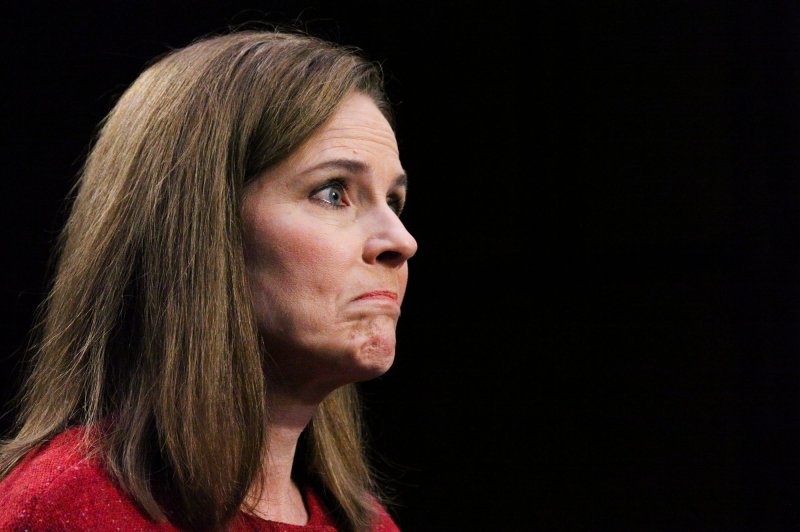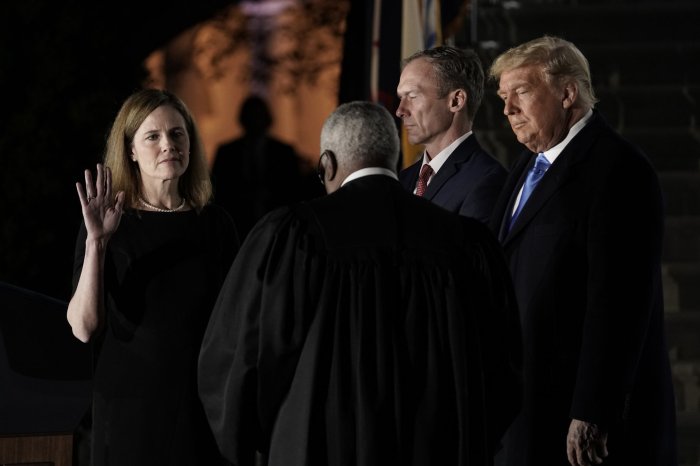1 of 14 | Supreme Court nominee Judge Amy Coney Barrett answers questions Tuesday on the second day of her confirmation hearing before the Senate Judiciary Committee on Capitol Hill in Washington D.C. Pool Photo by Bonnie Cash/UPI |
License Photo
Oct. 13 (UPI) -- Supreme Court nominee Amy Coney Barrett refused to share her views on the landmark 1973 case that legalized abortion in the United States during her high court confirmation hearing Tuesday.
Asked by Sen. Diane Feinstein, D-Calif., if she agreed with the view of her late mentor, Justice Antonin Scalia, that Roe vs. Wade was "wrongly decided," Barrett demurred, saying it would be inappropriate to comment on controversial issues such as abortion.
"It would be wrong for me to do that as a sitting judge," she said, adding she would not "grade" decisions made by Scalia or other justices.
Feinstein pressed further, saying Barrett's views on Roe vs. Wade could affect "millions of women. You could be a very important vote."
But Barrett again would not answer, saying, "Senator, I completely understand why you are asking the question, but again, I can't pre-commit or say 'yes, I'm going in with some agenda.'"
She referenced the so-called Ginsburg rule -- "no hints, no forecasts, no previews" -- a quote by then-nominee Ruth Bader Ginsburg who similarly refused to share her personal opinion on issues during her confirmation.
"That had been the practice of nominees before her, but everybody calls it the Ginsburg rule because she stated it so concisely and it has been the practice of every nominee since," Barrett said.
Barrett faced questioning Tuesday from lawmakers on the second day of her confirmation hearings. On Monday, she and members of the Senate judiciary committee read opening statements and settled procedural matters.
Each of the 22 committee members were given 30 minutes to question Barrett.
A second day of questioning will be held Wednesday, followed by a scheduled committee vote on Thursday. Barrett is expected to be confirmed along party lines. If approved, her nomination would move to the full Senate for a final vote, where she needs a simple majority to become a Supreme Court justice.
Earlier Tuesday, President Donald Trump's third high court nominee told committee members she will be able to set aside her own strong religious beliefs and rule with impartiality on all legal matters presented to the high court.
Asked by committee chairman Sen. Lindsey Graham, R-S.C., if she can put aside her Catholic beliefs as a Supreme Court justice, Barrett was insistent.
"I can. I have done that in my time on the 7th Circuit," she answered. "If I stay on the 7th Circuit, I'll continue to do that. If I'm confirmed to the Supreme Court, I will do that."
Sen. Sheldon Whitehouse, D-R.I., declined to ask Barrett any questions Tuesday and instead used his time to present his thoughts on the Federalist Society, a conservative group with which Barrett has been involved. He accused the group of being involved in a coordinated effort to stack the federal courts.
"It's one scheme, with the same funders selecting judges, funding campaigns for the judges and then showing up in courts in these orchestrated amicus flotillas and telling judges what to do," he said.
Barrett was a member of the group in 2005-06 and again in 2014-17.
Barrett vowed in her opening statement on Monday that she would be fair and impartial on the Supreme Court.
Barrett, 48, praised the conservative Scalia, who died four years ago, as well as the liberal Ginsberg, whose death last month created the new vacancy on the high court bench.
During her testimony, Barrett sought to allay Democratic concerns that she would be a conservative activist by saying she has tried in the 7th Circuit "to reach the result required by the law, whatever my own preferences might be."
Skepticism was evident among the opening statements from Democratic senators Monday, many of whom focused on how Barrett might rule in an upcoming legal challenge to the Affordable Care Act.
They voiced fears that Barrett could be the pivotal vote in a case brought by Republican state officials seeking to dismantle the ACA, which Democrats say could strip insurance coverage for 20 million Americans during a pandemic.
Barrett testified Tuesday that she has never discussed the ACA with Trump or anyone else, saying under questioning that she has never been pressured to strike it down.
Sen. Kamala Harris, D-Calif., used her time to frame Barrett's nomination as part of the Republicans' push to scrap ACA, stating the confirmation hearing is not in line with what Americans need from the government amid the pandemic.
She said, via teleconference from her office, that Republicans over the last nine years have tried 70 times to repeal or roll back the ACA in Congress and that they were now "scrambling to confirm this nominee as fast as possible because they need one more Trump judge on the bench before Nov. 10 to win and strike down the entire Affordable Care Act."
"This is not hyperbole," she said. "This is not a hypothetical. This is happening."
Harris, the last Democrat of the day to question Barrett, grilled the nominee over her previous criticisms on the ACA and asked if she had been aware of Trump's comments on seeking to nominate a justice who would strike down the ACA.
"I don't recall hearing about or seeing such statements," she said.
Harris later asked her as a sitting judge if she considers the impacts of her rulings on people's lives as the repeal of the ACA will impact millions.
"Every case has consequences on people's lives, so of course I do on every case that's part of the judicial process," Barrett responded.
Democrats also voiced demands that Barrett recuse herself from any case pertaining to the Nov. 3 election after Trump linked her confirmation with the need for nine justices to decide cases arising from a contested presidential race.
Barrett's participation in any case involving Trump's election "would immediately do explosive enduring harm to the court's legitimacy and to your own credibility," Sen. Richard Blumenthal, D-Conn., said in his opening statement Monday. "You must recuse yourself."
Amy Coney Barrett is sworn in as a U.S. Supreme Court justice in a ceremony on the South Lawn of the White House on Monday, October 26, 2020. Photo by Ken Cedeno/UPI |
License Photo
















